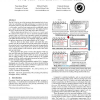Free Online Productivity Tools
i2Speak
i2Symbol
i2OCR
iTex2Img
iWeb2Print
iWeb2Shot
i2Type
iPdf2Split
iPdf2Merge
i2Bopomofo
i2Arabic
i2Style
i2Image
i2PDF
iLatex2Rtf
Sci2ools
136
click to vote
PPOPP
2016
ACM
2016
ACM
Be my guest: MCS lock now welcomes guests
The MCS lock is one of the most prevalent queuing locks. It provides fair scheduling and high performance on massively parallel systems. However, the MCS lock mandates a bring-your-owncontext policy: each lock user must provide an additional context (i.e., a queue node) to interact with the lock. This paper proposes MCSg, a variant of the MCS lock that relaxes this restriction. Our key observation is that not all lock users are created equal. We analyzed how locks are used in massively-parallel modern systems, such as NUMA-aware operating systems and databases. We found that such systems often have a small number of “regular” code paths that enter the lock very frequently. Such code paths are the primary beneficiary of the high scalability of MCS locks. However, there are also many “guest” code paths that infrequently enter the lock and do not need the same degree of fairness to access the lock (e.g., background tasks that only run periodically with lower priority). These gue...
| Added | 09 Apr 2016 |
| Updated | 09 Apr 2016 |
| Type | Journal |
| Year | 2016 |
| Where | PPOPP |
| Authors | Tianzheng Wang, Milind Chabbi, Hideaki Kimura |
Comments (0)

